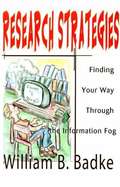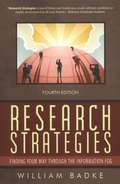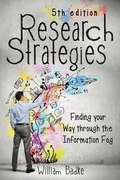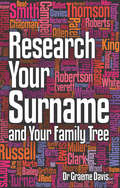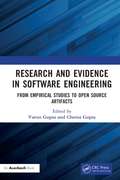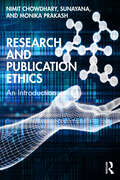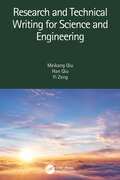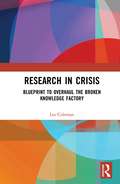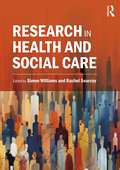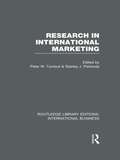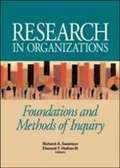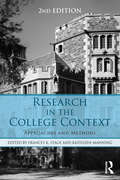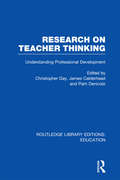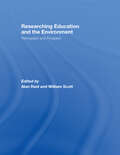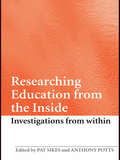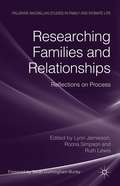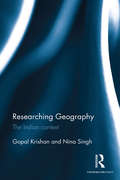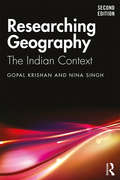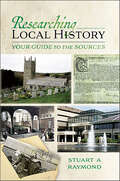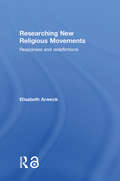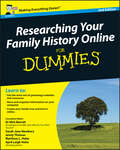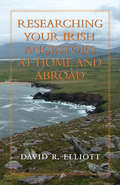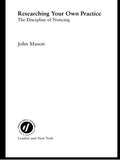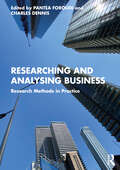- Table View
- List View
Research Strategies: Finding Your Way Through the Information Fog
by William B. BadkeFilled with time-tested strategies and expert advice, Research Strategies teaches you the skills that are essential to the success of any research project.
Research Strategies: Finding Your Way Through the Information Fog 4th Edition
by William BadkeBecause of the dynamic nature of the Internet, any web addresses or links contained in this book may have changed since publication and may no longer be valid. The views expressed in this work are solely those of the author and do not necessarily reflect the views of the publisher, and the publisher hereby disclaims any responsibility for them.
Research Strategies: Finding Your Way through the Information Fog
by William BadkeOnline resources have given us access to more knowledge than ever before. We're buried in data, and defining what is and what is not genuine information becomes more of a challenge all the time. In this fifth edition of Research Strategies, author William Badke helps you make sense of all of the available information, shows you how to navigate and discern it, and details how to use it to your advantage to become a better researcher. Badke focuses on informational research and provides a host of tips and advice not only for conducting research, but also for everything from finding a topic to writing an outline to documenting resources and polishing the final draft. Study guides, practice exercises, and assignments at the end of each chapter help reinforce each lesson. An experienced research instructor who has led thousands of students to become better researchers, Badke uses humor to help you gain a better understanding of today's complex, technological world. Research Strategies provides the skills and strategies to efficiently and effectively complete a research project from topic to finished product. It shows how research can be exciting and even fun.
Research Your Surname and Your Family Tree
by Dr Graeme DavisFind out what your surname means and trace your ancestors who share it too. Perhaps your surname is that of a Norman who came to Britain after the Battle of Hastings; or a Celtic clan name. Maybe it is an old English trade. It may be distinctive of a particular location. And just possibly you might be related to everyone who bears the name. Find out! Your surname is part of you -- so use this book to discover what it really means. This comprehensive book will show you how to research your surname and your family tree, both in earliest and in more recent years. It provides practical activities to investigate the meaning of any British surname. You will discover: -- The meaning of your surname -- How old it is -- Where it comes from -- What associations it has today -- How to use your surname to trace ancestors You may also be able to take part in a One Name Study or use DNA profiling to make contact with other people who bear your surname and with whom you share distant ancestors.
Research Your Surname and Your Family Tree
by Graeme DavisFind out what your surname means and trace your ancestors who share it too. Perhaps your surname is that of a Norman who came to Britain after the Battle of Hastings; or a Celtic clan name. Maybe it is an old English trade. It may be distinctive of a particular location. And just possibly you might be related to everyone who bears the name. Find out! Your surname is part of you -- so use this book to discover what it really means. This comprehensive book will show you how to research your surname and your family tree, both in earliest and in more recent years. It provides practical activities to investigate the meaning of any British surname. You will discover: -- The meaning of your surname -- How old it is -- Where it comes from -- What associations it has today -- How to use your surname to trace ancestors You may also be able to take part in a One Name Study or use DNA profiling to make contact with other people who bear your surname and with whom you share distant ancestors.
Research and Evidence in Software Engineering: From Empirical Studies to Open Source Artifacts
by Varun Gupta Chetna GuptaResearch and Evidence in Software Engineering: From Empirical Studies to Open Source Artifacts introduces advanced software engineering to software engineers, scientists, postdoctoral researchers, academicians, software consultants, management executives, doctoral students, and advanced level postgraduate computer science students. This book contains research articles addressing numerous software engineering research challenges associated with various software development-related activities, including programming, testing, measurements, human factors (social software engineering), specification, quality, program analysis, software project management, and more. It provides relevant theoretical frameworks, empirical research findings, and evaluated solutions addressing the research challenges associated with the above-mentioned software engineering activities. To foster collaboration among the software engineering research community, this book also reports datasets acquired systematically through scientific methods and related to various software engineering aspects that are valuable to the research community. These datasets will allow other researchers to use them in their research, thus improving the quality of overall research. The knowledge disseminated by the research studies contained in the book will hopefully motivate other researchers to further innovation in the way software development happens in real practice.
Research and Publication Ethics: An Introduction
by Nimit Chowdhary Sunayana Monika PrakashThis book provides a comprehensive overview of research and publication ethics and guides young researchers on how to conduct ethical research and publish their work responsibly. It presents an understanding of ethical practices in research and how they apply to research and publication by examining the different ethical theories and their application. The book also discusses the different factors influencing ethical decision-making and probes into the ethical issues that can arise in the research process. It explores the different forms of scientific misconduct, such as data fabrication and falsification, plagiarism, and conflicts of interest, and provides strategies for ethical research. The book also details the impact of scientific misconduct on research and publication and the strategies for preventing and detecting misconduct.Aligning to the belief that promoting ethical research practices is essential for advancing science and society, this book will be helpful for young researchers, scholars, aspiring researchers, and academicians interested in ethical research practices in multiple disciplines.
Research and Technical Writing for Science and Engineering
by Yi Zeng Meikang Qiu Han QiuEngineering and science research can be difficult for beginners because scientific research is fraught with constraints and disciplines. Research and Technical Writing for Science and Engineering breakdowns the entire process of conducting engineering and scientific research. This book covers those fascinating guidelines and topics on conducting research, as well as how to better interact with your advisor. Key Features: advice on conducting a literature review, conducting experiments, and writing a good paper summarizing your findings. provides a tutorial on how to increase the impact of research and how to manage research resources. By reflecting on the cases discussed in this book, readers will be able to identify specific situations or dilemmas in their own lives, as the authors provide comprehensive suggestions based on their own experiences.
Research in Crisis: Blueprint to Overhaul the Broken Knowledge Factory
by Les ColemanThis book explores the weak explanatory and predictive power of theories across disciplines, explains reasons for limited expertise after centuries of scientific effort, and sets forth strategies to accelerate knowledge and manage a future we can only dimly comprehend. Gaps in knowledge arose because common, natural and artificial phenomena are fundamentally hard to understand, and in expertise persists because research is unproductive. This book argues that weak research comes with huge opportunity cost because it stymies optimum decision making by government, corporations and individuals. Research needs restructuring which must come from governments’ top down requirement that funding bodies foster applied research with real-world impact, and that universities influence scientific publishers to improve their publications’ integrity. This book seeks to catalyse extinction events for theories in most disciplines, which would clear a path for solving multiple crises in research. The author cautions that this process would be disruptive, unpopular and painful.
Research in Health and Social Care
by Simon Williams Rachel SearceyResearch in Health and Social Care equips students and early-career practitioners with the crucial knowledge, skills and understanding required to conduct sound research. Accessibly written, it is structured to allow professionals and students to engage in the theoretical development of their practice in ethical and reflective research.Each chapter is co-written with students, featuring vignettes from health and social care students that highlight their personal journeys with research engagement. Content includes: exploring the everyday nature of research, processes, procedures and analysis; demystifying key terminology; an introduction to research and its importance in practice; creative and traditional tools of research; analysing data and how to disseminate data; approaches to research; embedding research into practice. Discussions around key theoretical ideas are explored throughout, as well as opportunities for deep reflection. This essential book is perfect for all social work and health and social care students, as well as early-career practitioners, aiming to deepen their knowledge and skills in conducting robust, ethical and relevant developmental research.
Research in International Marketing (Routledge Library Editions: International Business)
by Peterw. Turnbull Stanley J. PaliwodaThis book considers problems which can be serious obstacles in international marketing but which are much less difficult in domestic marketing, such as cultural differences; the establishing and maintaining of relationships with customers’ and the special problems for firm strategy and organisation arising from the internationalisation process.
Research in Organizations: Foundation and Methods of Inquiry
by Richard A. Swanson Elwood F. Holton IIIResearch in Organizations offers a holistic perspective of the subject that embraces quantitative, qualitative, and mixed-methodology research procedures.
Research in the College Context: Approaches and Methods
by Frances K. Stage Kathleen ManningResearch in the College Context, 2nd Edition provides faculty, students, practitioners, and researchers in the college environment with a manual of diverse approaches and methods for researching higher education and college students. The text offers the reader a variety of qualitative and quantitative research tools including interviewing, surveys, mixed methods, focus groups, visual methods, participatory action research, policy analysis, document analysis and historical methods, secondary data analysis, and use of large national data sets. This revised edition provides readers with current and innovative methodological tools needed to research the complex issues facing higher education today. Each technique is thoroughly presented with accompanying examples, advice for designing research projects, and tips for data collection, analysis, and dissemination of results. Clearly organized and accessible, this volume is the essential guide for experienced and novice researchers.
Research on Teacher Thinking: Understanding Professional Development (Routledge Library Editions: Education)
by Pam Denicolo Christopher Day James CalderheadThis is a companion volume to the editors’ Insights into Teachers’ Thinking and Practice (Falmer Press, 1999) and seeks to carry the discussion on further illustrating that there is a continuing intensity of thought, activity and debate on how to conceptualise research on teacher thinking, and thus generate knowledge for further understanding and action. The ethical questions on undertaking research on the inner lives of teachers remain unresolved. The international team present chapters which investigate the relationship between the researcher and the researched, and the relevance and role of research in teacher development. The papers are not presented as ‘best practice’ for such definitions would be inevitably value laden. Rather, they are indications and anticipations of key areas for the development of understanding of teachers’ thinking and actions in the 1990s.
Researching Education and the Environment: Retrospect and Prospect
by William Scott Alan ReidPreviously published as a special issue of Environmental Education Research, this collection includes some of the most influential and important articles contributed to the field over the last decade. Drawing out the best articles from volumes one to ten, the editors highlight six major themes:EE and ESD: tension or transition? locating the environ
Researching Education from the Inside: Investigations from within
by Pat Sikes Anthony PottsResearching Education from the Inside focuses on research projects that are undertaken by people who already have an attachment to the institutions or social groups on which their investigations are based. They can, therefore, be considered to be ‘insiders’. In some cases their insider positioning is primarily important because it gets them access to the particular people and/or the phenomena that they want to investigate. At other times, however, aspects of their own ‘insidership’ will, in itself, come under scrutiny. Insider researchers need to consider five distinct stages that can lead to ethical dilemmas, namely: Entering the field, Being in the field, Leaving the field, Writing, and Disseminating the results. This book covers these stages whist considering important issues such as: Access, Choice of research methods, Field relationships, Involvement of informants, Confidentiality and anonymity, Interpretation of findings including validity and reliability. Failure to properly consider these key factors can lead to disastrous consequences for any research but it can be a special problem for insider investigators. These vital issues are discussed by an impressive range of contributors in this ground-breaking book, making it an invaluable resource for anyone participating in Insider Research.
Researching Families and Relationships
by Ruth Lewis Lynn Jamieson Roona SimpsonThis collection focuses on the real life experiences of conducting emprical research about families and relationships, with an emphasis on the actualities of doing research and the experiences of being a researcher.
Researching Geography: The Indian context
by Nina Singh Gopal KrishanThis book is a one-stop comprehensive guide to geographical inquiry. A step-by-step account of the hows and the whys of research methodology. Introduces students to the complexities of geographical perspective and thought, essentials of fieldwork, formulation of research topics, data collection, analysis and interpretation as well as presentation and dissemination. Includes inputs and specific examples to help practitioners negotiate between theory and practice. Uses a lucid, engaging and literary style. It will be an essential companion for researchers and students of geography, social sciences, and South Asian studies.
Researching Geography: The Indian context
by Nina Singh Gopal KrishanThis book is a one-stop comprehensive guide to geographical inquiry. A step-by-step account of the hows and the whys of research methodology; Introduces students to the complexities of geographical perspective and thought, essentials of fieldwork, formulation of research topics, data collection, analysis and interpretation as well as presentation and dissemination; Includes inputs and specific examples to help practitioners negotiate between theory and practice; The second edition reflects updates in current trends in sampling, data interpretation, and data analysis. Lucid, engaging and accessible, this book will be an essential companion for researchers and students of geography, social sciences, and South Asian studies.
Researching Local History: Your Guide to the Sources
by Stuart A. RaymondHow has the place we live in changed, developed, and grown over the centuries? That is the basic question local historians seek to answer. The answer is to be found in the sources of information that previous generations have left us. The records of parish, county, and diocesan administration, of the courts, of the national government, and of private estates, all have something to tell us about the history of the locality we are interested in. So do old newspapers and other publications. All of these sources are readily available, but many have been little used. Local historians come from a wide diversity of backgrounds. But whether you are a student researching a dissertation, a family historian interested in the wider background history of your family, a teacher, a librarian, an archivist, an academic, or are merely interested in the history of your own area, this book is for you. If you want to research local history, you need a detailed account of the myriad sources readily available. This book provides a comprehensive overview of those sources, and its guidance will enable you to explore and exploit their vast range. It poses the questions which local historians ask, and identifies the specific sources likely to answer those questions.
Researching New Religious Movements: Responses and Redefinitions
by Elisabeth ArweckNew religious movements such as the Moonies, Jehovah's Witnesses and Hare Krishnas are now well established in mainstream cultural consciousness. But responses to these 'cult' groups still tend to be overwhelmingly negative, characterized by the furious reactions that they evoke from majority interests. Modern societies need to learn how best to respond to such movements, and how to interpret their benefits and dangers.Researching New Religious Movements provides a cutting-edge analysis of the controversy around new religions in America and Europe today. Drawing on original fieldwork, it explores the battles between the recruiting factions of groups like the Moonies, and the anti-cult movements and Church societies that have mobilized to oppose these. It considers academic and media interventions on both sides, placing special emphasis on the problems of objectivity inherent in the language of 'sects', 'abduction' and 'brainwashing'. Ideal for students, researchers and professionals, this provocative and much-needed book takes the debate over new religious movements to a newly sophisticated level.
Researching Your Family History Online For Dummies
by Matthew L. Helm April Leigh Helm Sarah Newbery Jenny Thomas Nick BarrattNavigate your way through your family's past. Interested in family history? Keen to discover who your ancestors really were? Want to find out more from the comfort of your own home? If so, this book is for you. Walking you through the process of researching, organising and presenting your family tree online, this expert guide makes it simple. So what are you waiting for? Get plugged in and start tracking down your ancestors today!Lay the groundwork - take the first steps on your genealogical journey and start searching for evidence. Find out about your ancestors - discover who your predecessors were and where they came from. Get to grips with research tools - find the best online and offline archives and dig deeper into your family's past. Present your results effectively - compile your findings into a family tree and create a place to host your material online. Open the book and find:What clues you can get from photos, letters, diaries and your relatives. The best genealogy websites in the UK and around the worldHow to get the most out of archives and documents. Techniques for creating family history charts on your computerThe advantages of coordinating your hunt with other researchers. Ways to share research online. Tips and tricks for building a family history web page. Learn to: Get the most out of genealogy websites and resources. Store and organise information on your computer. Create your family tree and host it online.
Researching Your Irish Ancestors at Home and Abroad
by David R. ElliottA one-stop guide for people seeking information about their ancestors in Ireland. This book will help all those, no matter where they live, who are searching for ancestors in Ireland. David R. Elliott has taken eight research trips to Ireland on behalf of his clients and has worked in most archival repositories in the Republic of Ireland and Northern Ireland. Dr. Elliott gives clues to finding your ancestral county, then the parish and townland within the county. He explains how Irish archival centres work and describes how you can flesh out your ancestors lives and what you might find in cemeteries.An experienced genealogist and seasoned traveller, Dr. Elliott gives practical advice on preparing for your trip with tips on travel, driving, accommodation, and meals. Ireland’s unique history is outlined, as well as the impact that religion and politics have had on genealogical research. An annotated bibliography and a review of important websites round out this illustrated guide.
Researching Your Own Practice: The Discipline of Noticing
by John MasonCentral to caring professions such as teaching is the need to notice and be sensitive to the experiences of pupils and teachers. Starting from this position, Researching Your Own Practice demonstrates that in order to develop your professional practice you must first develop your own sensitivities and awareness. One must be attuned to fresh possibilities when they are needed and be alert to such a need through awareness of what is happening at any given time.By giving a full explanation of this theory and a guide to its implementation, this book provides a practical approach to becoming more methodical and systematic in professional development. It also gives the reader a basis for turning professional development into practitioner research, as well as giving advice on how noticing can be used to improve any research, or be used as a research paradigm in its own right.The discipline of noticing is a groundbreaking approach to professional development and research, based upon noticing a possibility for the future, noticing a possibility in the present moment and reflecting back on what has been noticed before in order to prepare for the future. John Mason, one of the discipline's most authoritative exponents, provides us here with a clear, persuasive and practical guide to its understanding and implementation.
Researching and Analysing Business: Research Methods in Practice
by Charles Dennis Pantea ForoudiResearching and Analysing Business: Research Methods in Practice provides an accessible and practical guide to various data collection and data analysis techniques within management, from both quantitative and qualitative perspectives. This key resource functions as a comprehensive reference tool – covering a broad variety of methodologies – examining both the theory behind them and their application in practice. These include systematic literature review through bibliometric and meta-analysis, secondary vs primary sources, qualitative research vs quantitative research, combining qualitative and quantitative methods, qualitative and quantitative research method approaches, fsQCA, data mining, and sentiment analysis. Chapters are rich in examples, data sets, practical exercises, easy-to-follow slides, and a glossary, which help readers to understand and apply research approaches as well as to assess the strengths and weaknesses of each method. Unique in its practical approach and with insights from active researchers, this book is required and recommended reading for advanced undergraduate and postgraduate students studying research methods as a core module within business and management courses. It is also a useful tool for PhD students and academics within the discipline. Online support materials include PowerPoint slides.
